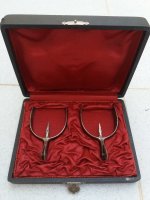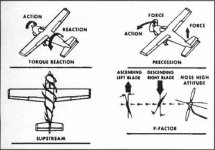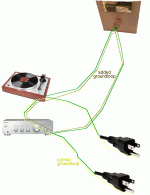A box full of dirt, or magic rocks, or coal, or whatever...with one single wire connected to something cannot possibly do anything except possibly PICK-UP noise and add it to the system, or as others here have pointed out - snake oil.
There will always be gullible humans willing to throw their money at some wonderful "new thing" in that says it will deliver some kind of audio magic, in spite of the fact that actual magic would be the only way it could work...I'm not one of those humans.
Mike
There will always be gullible humans willing to throw their money at some wonderful "new thing" in that says it will deliver some kind of audio magic, in spite of the fact that actual magic would be the only way it could work...I'm not one of those humans.
Mike
O M G.
//
This is the same ground as the signal ground in non-balanced connections. The mains grounding already is part of a ground loop and creating another grounding point does only complicate things further. The idea of the common grounding point would work beautifully if there was no mains grounding but would be against code in most countries.
i love this line..."When you connect your system to one of our groundboxes you offer this high frequence stay voltages a ground point where they can find peace instead of flowing arround in the system." Ground Boxes | Entreq
i did not know that noise and noise currents had an emotional state that required they find peace!!
Yep, they are going through your system in the seated lotus position, and if you listen very carefully you can hear them chant...Ohmmm, Ohmmm, Ohmmm... 😉
Mike
Adding a 'ground box' to an existing system does not create a loop. This is because the 'ground box' is not a ground, but merely an isolated box of dirt with a wire coming out. So you either have a ground loop (via the mains) or you don't; the 'ground box' makes no difference.analog_sa said:The devices which go into the common ground may also be grounded through the mains. This constitutes a ground loop by any definition.
I'm looking for a grounding box that also has real snake oil in it as well. Then it will REALLY be effective!!
they are not going through my system i condense them into klein bottles and sell them to visiting Ferengi for pressed latinum!Yep, they are going through your system in the seated lotus position, and if you listen very carefully you can hear them chant...Ohmmm, Ohmmm, Ohmmm... 😉
Mike
Adding a 'ground box' to an existing system does not create a loop....
Depending how it is wired, it can add an AC/RF-catching loop in the audio system common. See image. Some details skimped (the turntable may have separate chassis and needle commons). And this objection would be reduced with a single conductor to the "ground box", reducing the LF loop to an RD-only monopole.
Here is a product clearly intended for MANY ground connections (but no dirt). Combined with grounded power plugs, nobody could trace all the possible loops. (Yes, un-grounded power plugs exist and this product would then hold the entire system to the same potential; but so would a $14 intersystem bonding termination.)
And of course if the "ground box" causes trouble, you rip it out and sell it on.
The *only* time I can recall working to create a DIRT ground was in an open field powered by an unknown generator (looked like war surplus). For the safety of my clients and me I brought a dirt-rod, hammer, jumper, so I could be pretty sure the musicians' mikes were near the ground potential they were standing on.
Having made many more dirt-bonds for power purposes, and replaced much equipment due to stray-path discharges, I know it takes a LOT more than a wad of foil in potting soil to make a "ground" that can do anything groundy. My last place (home of the fried modems) I went in the crawlspace to get on the buried metal pipe from the abandoned cistern. Here I have two 10-foot rods (recently inspected) buried next to the septic field, two in the footings under the livingroom, and another at the other side of the septic for the garage, all bonded with large wire. Even so I don't have <30 Ohms to "true ground" (which may not exist on this peninsula). If I throw a 120V live wire in the dirt it won't hardly make hot dirt, certainly not blow a fuse.
Attachments
One casual cite says a "ground box" may be filled with fine tourmaline sand.
Which is cool, because tourmaline is found here in Maine, as well as other places.
Benjamin Wilson investigated the electrical properties of tourmaline; note that his concept of electricity differed from Franklin's.
The grade used seems to cost $200/pound. But small tourmaline stones are $7/pound, a hammer is $9. If your arm gets tired, I found a China company sells tourmaline crushers larger than a truck.
AFAICT, tourmaline is not an electrical conductor. It can be piezoelectric if force is applied. (And piezos really can't be conductors.) Iron-rich tourmaline may be slightly magnetic.
Also Pyroelectric, an interesting thing.
Inside a box, with no looped conductors, pressure, heat, I can not see any electrical effects.
BUT tourmaline is claimed to have "healing power". Random reading: "Tourmaline is helpful in treating paranoia, dyslexia, improves hand/eye coordination. Tourmaline cleanses, purifies and transforms dense slow moving energy into lighter vibrational energy. It grounds spiritual energy into the physical plane, This stone clears and balance all the chakras, and forms a protective shield around the body." I hope it improves digestion; some of the claims are hard to swallow.
Which is cool, because tourmaline is found here in Maine, as well as other places.
Benjamin Wilson investigated the electrical properties of tourmaline; note that his concept of electricity differed from Franklin's.
The grade used seems to cost $200/pound. But small tourmaline stones are $7/pound, a hammer is $9. If your arm gets tired, I found a China company sells tourmaline crushers larger than a truck.
AFAICT, tourmaline is not an electrical conductor. It can be piezoelectric if force is applied. (And piezos really can't be conductors.) Iron-rich tourmaline may be slightly magnetic.
Also Pyroelectric, an interesting thing.
Inside a box, with no looped conductors, pressure, heat, I can not see any electrical effects.
BUT tourmaline is claimed to have "healing power". Random reading: "Tourmaline is helpful in treating paranoia, dyslexia, improves hand/eye coordination. Tourmaline cleanses, purifies and transforms dense slow moving energy into lighter vibrational energy. It grounds spiritual energy into the physical plane, This stone clears and balance all the chakras, and forms a protective shield around the body." I hope it improves digestion; some of the claims are hard to swallow.
We always have to ground the generator trailers for show power. Things get squirrely if you don't.
True that grounding is not as easy as it seems. There is plenty of documentation on the subject.
True that grounding is not as easy as it seems. There is plenty of documentation on the subject.
The ground box does not create the loop; it is the wiring to it which creates the loop. The loop would still be present if the box disappeared but left its wiring behind.PRR said:Depending how it is wired, it can add an AC/RF-catching loop in the audio system common. See image.
Adding a 'ground box' to an existing system does not create a loop. This is because the 'ground box' is not a ground, but merely an isolated box of dirt with a wire coming out. So you either have a ground loop (via the mains) or you don't; the 'ground box' makes no difference.
Then you have not examined what goes into a ground box. It is basically a large metal spur to which all devices chassis get connected. The RF absorbing "dirt" is secondary. Depending on the grounding arrangements of each individual device you can have all sorts of unpredictable outcomes.
Perhaps all the RF is gathered in one place by the box so that it is more capable of making the final leap to Earth without getting lost on the way?
As I said, the ground box does not create a loop. People may make loops out of the wires connected to it.
Why have we wasted nearly 60 posts talking about nonsense? A ground box itself cannot do any good; at best it does nothing; at worst it picks up some RF and injects it into the ground at some random point in the system. Meanwhile, the wiring to it may add ground loops. Ground boxes only benefit the people selling them.
Why have we wasted nearly 60 posts talking about nonsense? A ground box itself cannot do any good; at best it does nothing; at worst it picks up some RF and injects it into the ground at some random point in the system. Meanwhile, the wiring to it may add ground loops. Ground boxes only benefit the people selling them.
It certainly introduces instability in rational thinking. The validity of the boxes would have been more clear, and more accurate, if we had referred to these as boxes of dirt rather than grounding boxes. You could remove the lid and use it as a planter box, and make the soundstage 'bloom'.
Ray K
Ray K
Not all of them contain dirt, so not all may be useful as planters. Some may be useful for indoor cats to use.
- Status
- Not open for further replies.
- Home
- Member Areas
- The Lounge
- What constitutes a grounding box?


